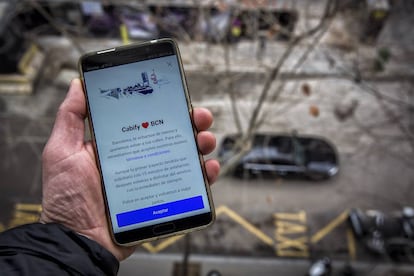Cabify returns to Barcelona using loophole against new restrictions
The ride-hailing service will only apply the 15-minute waiting period that was established by Catalan regulations to a customer¡¯s first journey

Ride-hailing service Cabify is operating again in Barcelona after pulling its services out of the city at the beginning of February in protest against restrictions introduced by the Catalan regional government.
The company says it has ¡°adapted¡± its service to comply with the new rules that force customers to request their services 15 minutes ahead of their planned journey. But Cabify will only apply this restriction the first time a customer makes a reservation. In all following reservations, customers will be able to ¡°enjoy the service with the usual immediacy¡± by signing a free one-year contract.
The business is coming to the rescue of the sector and the thousands of jobs created in Catalonia
Ride-hailing service Cabify
The new law from the regional government was passed in response to demands from taxi drivers, who have staged a series of strikes over what they consider to be unfair competition from companies such as Uber and Cabify, whose drivers operate in Spain using what are known as VTC (private hire) licenses.
After the law was approved, Uber and Cabify pulled their services out of Barcelona, arguing that the new rules would hurt their business. On Wednesday, Cabify announced that it had reconsidered the decision and adapted its service in order to operate again in the city. With a fleet of 300 cars, Cabify will stop being a third-party platform that connects customers to private drivers and become a transport business via the company Prestige & Limousine.
Cabify will avoid applying the 15-minute waiting period from the second reservation onward by inviting customers to sign a free, one-year contract, which can be renewed on a yearly basis.
The regional government is aware of this loophole but is holding off from taking action until Cabify¡¯s service is properly up and running again in the city. The regional public administration chief, Jordi Puigner¨®, celebrated Cabify¡¯s return but made no comment on the fact that the company will not respect the 15-minute waiting period on all reservations.

In a press release, Cabify defended its decision to bring its services back to Barcelona, arguing that ¡°nearly a million people are registered [with the service] in Catalonia.¡± It stated: ¡°The business is coming to the rescue of the sector and the thousands of jobs created in Catalonia, with the adoption of a new (and burdensome) business model.¡±
The Madrid-based company is confident that the legislation will be revoked. In its press release, Cabify argues that the law was approved by the Catalan parliament even though the Council for Statutory Guarantees, the advisory body of the lower house, warned that some of the restrictions could be unconstitutional as they threaten business rights. Cabify also highlighted similar warnings from Spain¡¯s competition watchdog, the CNMC.
As well as establishing a waiting period, which could be extended by other city halls and to the metropolitan area of Barcelona, the law bans geolocation and forces VTC drivers to return to a base or park their car once they have finished a journey until they receive their next reservation ¨C measures that were also demanded by the taxi sector.
Taxi drivers in Barcelona went on strike in January and blocked the city¡¯s Gran V¨ªa avenue for seven days. Drivers in Madrid joined the action, striking for 16 days, but did not reach an agreement with the regional government on VTC regulation, which has become a recurrent issue since Madrid transferred regulatory powers over ride-hailing services to regional governments
English version by Melissa Kitson.
Tu suscripci¨®n se est¨¢ usando en otro dispositivo
?Quieres a?adir otro usuario a tu suscripci¨®n?
Si contin¨²as leyendo en este dispositivo, no se podr¨¢ leer en el otro.
FlechaTu suscripci¨®n se est¨¢ usando en otro dispositivo y solo puedes acceder a EL PA?S desde un dispositivo a la vez.
Si quieres compartir tu cuenta, cambia tu suscripci¨®n a la modalidad Premium, as¨ª podr¨¢s a?adir otro usuario. Cada uno acceder¨¢ con su propia cuenta de email, lo que os permitir¨¢ personalizar vuestra experiencia en EL PA?S.
?Tienes una suscripci¨®n de empresa? Accede aqu¨ª para contratar m¨¢s cuentas.
En el caso de no saber qui¨¦n est¨¢ usando tu cuenta, te recomendamos cambiar tu contrase?a aqu¨ª.
Si decides continuar compartiendo tu cuenta, este mensaje se mostrar¨¢ en tu dispositivo y en el de la otra persona que est¨¢ usando tu cuenta de forma indefinida, afectando a tu experiencia de lectura. Puedes consultar aqu¨ª los t¨¦rminos y condiciones de la suscripci¨®n digital.










































